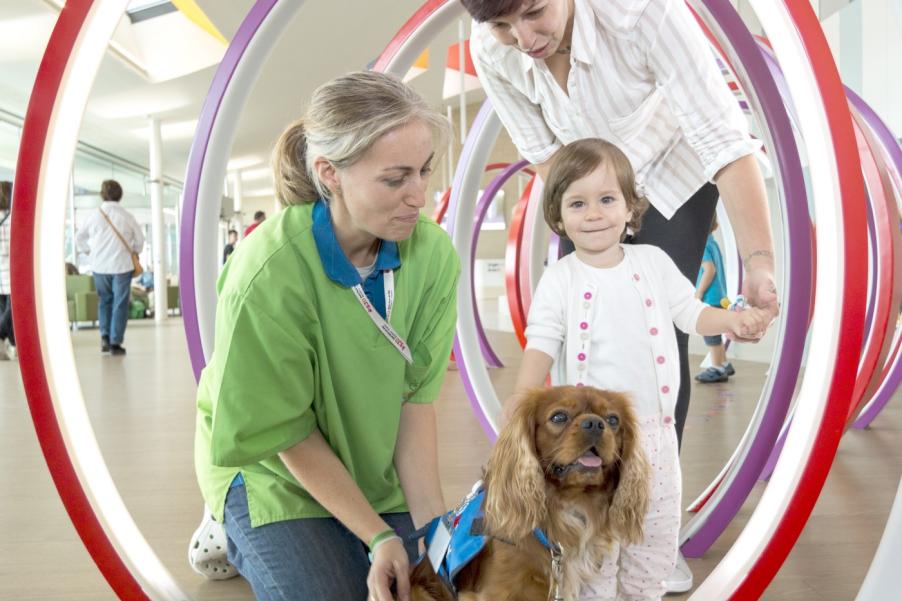
© Bram Kloos
Nearly 200 years ago, Florence Nightingale noticed a curious phenomenon — small pets seemed to lower stress levels in her psychiatric patients. A pioneer who founded the modern profession of nursing, she was among the first of many changemakers to recognize the potential of pets to make a positive difference.
In 2020, pet ownership is on the rise globally. Today social entrepreneurs have founded initiatives based on the pet-human connection that serve not only hospital patients, but groups like prison inmates, homeless populations, abuse survivors, abandoned animals, and the elderly.
As scientists explore just how animal companionship affects us, we’re launching an investigation of our own to uncover how social entrepreneurs are working to make our world better with pets.
The relationship between people and pets
Historians believe that humankind began domesticating animals almost 12,000 years ago, mostly to help with transportation and agricultural labor. Today, many animals have another role in human society — they’re our companions.
The interactions between people and pets can contribute to the wellbeing of both. The “animal-human bond,” according to the American Veterinary Medical Association, is “a mutually beneficial relationship that includes emotional, psychological, and physical interactions between people, animals and the environment.”
We might intuitively sense that we’re more secure, healthy, and happy when we’re around our pets. According to a report commissioned by Purina in 2016, pets benefit humans in multiple ways. Studies indicate that pets can help prevent certain health issues and diseases, including asthma and cardiovascular disease. Pets also help with treatment, aiding rehabilitation. They offer care and support, helping us manage anxiety and loneliness.
Science is still unclear about the full advantages — and drawbacks — of pet ownership. The field needs advocates of additional studies, so researchers caution against generalizing benefits based on current research. Still, we can already observe change happening in communities around the world.
Navigating trauma with pets
Both humans and pets experience trauma. They can also support each other during or after abuse and tragedies. Author Marie Yates knew this when she penned her teen fiction novel, ‘Reggie & Me,’ exploring the journey of a teenage rape survivor and the impact of her rescue dog on her recovery.
When readers reached out to Marie to ask for support, she responded by creating the UK-based organization Canine Perspective, as well as a specific program called Canine Hope, a social enterprise that provides and helps to develop emotional self-care and resilience for survivors of sexual violence.
Canine Hope introduces participants to a rescue dog, then uses the dog’s story of neglect or abuse to open discussions for participants to talk about their own experiences through the dog’s story, if they so choose. Later conversations focus on topics like the emotional impact of abuse, coping, resilience, self-care, empathy, and future goals.
In the Netherlands, Dutch Cell Dogs Foundations introduces shelter dogs to a different target group: prison inmates. Many of the dogs and detainees have lost trust in relationships, and some shelter dogs suffered a history of abuse. By building friendship and training the dogs, whose behavioral problems often limit their chance of finding a home, inmates help the animals to move past their trauma towards a better future. At the same time, this friendship enriches their own lives, often leading to a new, more social life.
Courtesy of Hospital Sant Joan de Deu
Towards a healthier world
Ever since small pets were introduced to patients in medieval Belgium in order to lift their spirits, pet therapy has become a popular topic of study and a treatment strategy for patients.
In 1859, Florence Nightingale famously wrote that “A small pet animal is often an excellent companion for the sick.” Later, informal experiments claimed that human-animal interactions created a calming effect, and an Austrian Nobel laureate in Physiology, together with a psychologist, developed the concept of the “human-animal bond.”
Beyond therapy, research is also exploring how pets can improve health outcomes through disease detection and prevention.
Medical Detection Dogs, based in the U.K., is harnessing dogs’ powerful sense of smell to help detect the early stages of Parkinson’s disease. In a study carried out with Manchester University and Edinburgh University, researchers used hundreds of samples to test dogs and trained them to respond with “yes” or “no” indications. Results suggest that dogs can detect the disease possibly many years before symptoms show. Now Medical Detection Dogs is also working to investigate and develop ways for dogs to detect malaria and cancer.
Pets can also help us stay healthy. Many studies show an association between pet companionship and lower risk of cardiovascular disease. Some suggest that dog and cat ownership is associated with lower resting blood pressure, and the presence of a pet acts like a buffer for stress-induced blood pressure spikes.
Pet interactions impact kids, too: a 2015 study showed that exposure to dogs and farm animals during the first year of life reduces the risk of asthma in children.
Companionship and community
Since people and pets both need social support, why not rely on each other?
In the Netherlands, the OOPOEH Foundation works to reduce loneliness and increase physical activity for the elderly by matching them as a dog sitter to a family in their neighborhood. Besides keeping each other company, the pair can go for walks and interact with other people and dogs. One participant, Christine, shared that she missed the company of a dog but “because of my age and fragile health, I did not dare to buy myself a dog anymore.” Through OOPOEH, she befriended a dog named Sammy and the dog’s owners.
Pets also provide essential social support for people without a home. In Canada, 12.8 percent of the homeless population owns pets. Because of their pets, however, they’re often refused social services or care — and their pets often don’t receive the care they need, either.
To solve this problem, Ashoka fellow Michelle Lem created Community Veterinary Outreach, using her veterinarian skills to start a free mobile clinic for pets and homeless pet-owners. At the same time, the organization provides public health, local shelter information and social services to homeless populations.
While specific challenges vary from one context to another, the need for social support is universal.
The future of the pet-human bond
Although this is a new and growing field of research, we’re learning more everyday about the pet-human bond and how it is transforming society. The connection between people and pets, especially when leveraged by social entrepreneurs, has the power to create positive impact.
Leading the way, Ashoka has partnered with Nestlé Purina to uncover innovative approaches to improve the lives of pets, people, and communities around the world through the second edition of the Purina BetterwithPets Prize in 2020.
We’re searching for social innovations — both piloted and idea-stage ventures — focused on harnessing the power of the pet-human bond to address issues such as trauma, social isolation, and health problems. If you’re working with people and dogs or cats in your community to make a difference, apply here or email [email protected].
Stay tuned as we continue exploring how we can collectively make our world better with pets.




